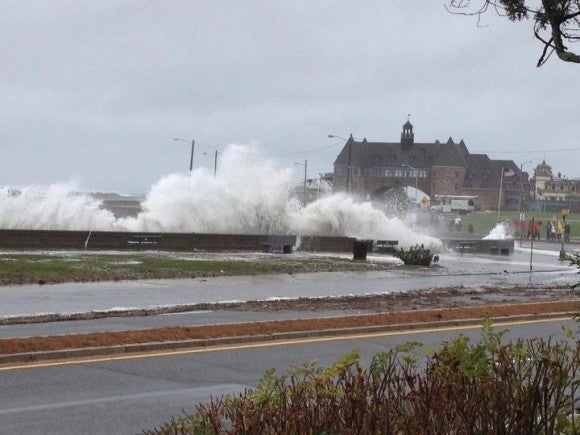
Emergency Preparedness
The University of Rhode Island holds the health and welfare of all of its students, faculty, and staff paramount. In the case of an emergency such as a natural disaster, it is important that everyone has access to information and resources to better prepare and inform our community in case of such an event.
Here at the Office of Commuter Affairs, we understand that students who live “down the line” are some of our most at-risk members of the community, since many of these students live in rental properties that are in close proximity to the water. By being close to water, these properties are potentially at risk to damages from natural disasters such as tropical storms and hurricanes. This page is dedicated to the welfare and well-being of all members of our community.
First 72 Hours
In most cases of weather emergencies, it is commonplace to begin last-minute preparations 72 hours before the event takes place. It is during this time that people should stock up on groceries, batteries, etc. in case the power goes out or you are prevented from being able to leave your home.
- Food: begin by buying the absolute necessities, and rely on buying non-perishable items in case the power goes out and you find yourself unable to refrigerate items. Some suggestions include: canned soup, bread, peanut butter, etc…
- Water: water is an absolute necessity, not only for drinking but also for cooking. If you find yourself in a position where you don’t have access to drinkable water, it’s important to have a stockpile of bottled/sealed water which you can use safely.
- First Aid Supplies: Bandages, disinfectants, and medications should all be stockpiled.
- Miscellaneous items including: rechargeable phone chargers, flashlight (with extra batteries,) fire extinguisher, blankets, heavy clothing, money, tools, generator, gas powered cooking appliances, etc…
- Also, make sure to charge all of your portable electronics before the storm. If the power goes out, you are going to want things like your phone and laptop/portable device to be fully charged.
For a more items you might need during an emergency, please consult Rhode Island Emergency Management Agency’s comphremeise list.
Mid-Storm
While the storm is raging, it is important to stay up to date with announcements made by local officials via television and through the internet. Stay inside your home, and wait out the storm unless instructed to evacuate. In the case of an emergency, call 911 immediately. It is also good to avoid windows in case a piece of debris happens to strike a window and shatter the glass. Unplug your expensive appliances and electronics, if a power line goes down you do not want them being short circuited by a power surge. If you find that all of your electronics have died, try and find a radio to stay up with updates from local agencies.
Post-Storm
Once your local authorities have announced that it is safe to go outside, you are free to leave your home and inspect the damages around your property. You should contact your landlord or property manager to notify them of any damages. Always avoid downed power lines. Board up any broken windows to protect your security, then make a plan to make the necessary repairs. If you rely on natural gas at your home, check to make sure that none of the gas lines are damaged or broken. If you find that there is damage to one of these lines, inform your landlord and call your utility company to schedule repairs. While making these temporary repairs, make an expense report to show your landlord how much money you spent. Also, catalog all damages, no matter how big or small, to ensure you do not lose your security deposit.
Evacuation
In rare cases of an extremely dangerous weather event, you may be ordered to evacuate. Pay attention to local media and emergency alerts or use the evacuation maps from RIEMA.
